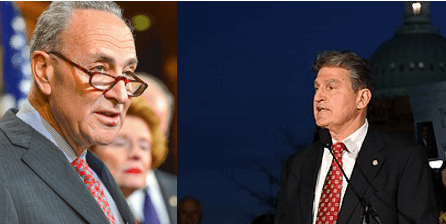
Wikimedia Commons
The negotiations between Senate Majority Leader Chuck Schumer and Senator Joe Manchin (D-WV) over a new budget reconciliation deal have been great fodder for political journalists, but they are also incredibly important to American seniors. Senators Schumer and Manchin are haggling over a pared-down version of the Build Back Better legislation, which the West Virginia Senator effectively killed earlier this year, designed to pass with only Democratic votes via the reconciliation process. The new package reportedly retains some crucial items for older Americans: prescription drug pricing reform and Medicare solvency.
According to press reports, the Schumer-Manchin deal finally would allow Medicare to negotiate prescription drug prices with Big Pharma – a marquee provision of the old Build Back Better plan. Drug price negotiation could save the Medicare program some $288 billion over ten years and exert downward pressure on prescription prices in general. This would be welcome news for seniors on fixed incomes who are skipping medications because of prohibitive costs.
“Under the Drug Price Negotiation Program (DPNP) that would be established in the Senate proposal, beginning in 2023, the secretary of health and human services would be required to negotiate lower prices for 10 of the most expensive drugs that lack market competition, with these prices going into effect in 2026. The number of drugs would increase to 20 by 2029.” – Center for American Progress, 7/12/22
The reconciliation bill reportedly also would cap Medicare Part D beneficiaries’ out-of-pocket drug costs at $2,000 per year. Currently, there is no limit on how much Medicare patients – whose median annual income is $26,000 – must pay out of pocket for prescriptions. The Schumer-Manchin deal would go further, requiring drugmakers to pay rebates for any price hikes exceeding the rate of inflation. “Just this year, some drug companies increased prices upward of 16 percent (more than double the rate of inflation), making already expensive drugs even more unaffordable,” observes the Center for American Progress.
There is more good news for Medicare in the reconciliation package. The Schumer-Manchin deal would bolster the solvency of the Part A Trust fund by closing a tax loophole so that wealthy business owners pay the 3.8% Net Investment Income Tax (NIIT). Revenue generated from the NIIT would be diverted to the Medicare Part A trust fund, which is currently projected to run dry in 2028. This provision would extend the life of the Part A trust fund for at least a decade from now, according to Rep. Lloyd Doggett, who introduced similar legislation in the House this week. NCPSSM President and CEO Max Richtman lauded Doggett’s legislation as a reasonable step to ensure Medicare’s financial health:
“The justifiably acute concern for the future solvency of the Medicare Trust Fund calls for common sense, immediate solutions that do not impose additional financial burdens on beneficiaries… (This legislation) meets both requirements by claiming misdirected tax revenue from the Treasury back to the Medicare Trust Fund.” – NCPSSM President and CEO Max Richtman, 7/11/22
None of this is certain. Senator Manchin signaled agreement with the Build Back Better plan throughout the past year, only to withdraw his support at the last minute. The current negotiations – which Senator Schumer is conducting virtually during his COVID isolation in Brooklyn – could fall apart at any time. Manchin told Politico, “(Senator Schumer) knows exactly where I’m at. Now whether (the Democrats) can get there or whatever, we’ll see.”
The deal reportedly taking shape is not nearly as ambitious or sweeping as Build Back Better, which would have expanded Medicare to cover basic hearing care. But seniors’ advocates, including NCPSSM, will gladly accept a partial victory that includes improved Medicare solvency without benefit cuts and the long-sought goal of prescription drug price negotiation. As the Center for American Progress so aptly put it, “After decades of inaction, Congress cannot let this effort for reform simply come and go.”


